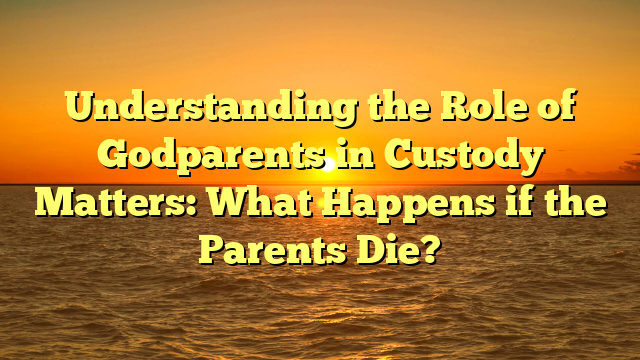Understanding the Role of Godparents in Custody Matters: What Happens if the Parents Die?
Introduction
Godparents play a significant role in the lives of children, not only in religious ceremonies but also in custody matters. In the unfortunate event of the parents’ death, godparents may be called upon to assume the responsibility of raising the child. This article aims to shed light on the role of godparents in custody matters and what happens if the parents pass away.
The Role of Godparents
Traditionally, godparents were chosen to guide the child’s spiritual upbringing and serve as mentors in matters of faith. However, their role has evolved over time, extending beyond religious obligations. Godparents often develop a close bond with the child and become trusted individuals in their lives.
In custody matters, godparents can play a crucial role in ensuring the child’s well-being and providing a stable environment. They may be appointed as legal guardians or have a significant say in determining the child’s future.
Legal Guardianship
When parents pass away, the court may appoint a legal guardian for the child. In many cases, godparents are given priority consideration for this role. However, it is important to note that the court’s decision ultimately depends on various factors, including the best interests of the child.
If the godparents are willing and capable of assuming the responsibility, they may need to go through a legal process to establish their guardianship. This typically involves filing a petition with the court and providing evidence of their suitability to care for the child.
Factors Considered by the Court
When determining the custody arrangements for a child whose parents have passed away, the court takes several factors into consideration. These factors may include:
- The child’s relationship with the godparents
- The godparents’ ability to provide a stable and nurturing environment
- The child’s preferences, if they are of an appropriate age
- The godparents’ financial stability
- The godparents’ physical and mental health
It is essential for godparents to demonstrate their commitment to the child’s well-being and provide evidence of their suitability to assume custody.
What Happens if the Parents Die?
In the unfortunate event of the parents’ death, the child’s custody may be determined through various legal processes. If the parents have named godparents in their will or through a legal document, the court will consider their wishes. However, the court’s primary concern is always the best interests of the child.
If the parents have not designated godparents, the court will assess the child’s situation and make a decision based on the factors mentioned earlier. It is crucial for godparents to be prepared and willing to assume custody if called upon.
Alternatives to Godparents
In some cases, the court may determine that the godparents are not the most suitable individuals to assume custody. In such situations, alternative arrangements may be made. These alternatives may include:
- Relatives: The court may consider close relatives, such as grandparents, aunts, or uncles, as potential guardians.
- Foster Care: If no suitable family members are available or willing to assume custody, the child may be placed in foster care until a suitable guardian is found.
- Adoption: In rare cases, the court may decide that adoption is in the best interests of the child, and the godparents may need to go through the adoption process.
It is important for godparents to understand that their role in custody matters is not guaranteed, and they should be prepared for alternative outcomes.
Conclusion
Godparents play a significant role in custody matters when parents pass away. While their traditional role is rooted in religious ceremonies, they can also be appointed as legal guardians for the child. However, the court’s decision ultimately depends on various factors, including the best interests of the child. Godparents should be prepared to demonstrate their suitability and commitment to the child’s well-being. It is essential to understand that alternative arrangements may be made if the court determines that the godparents are not the most suitable individuals to assume custody. Ultimately, the well-being and best interests of the child should always be the primary consideration in custody matters.
References
1. [Source 1]
2. [Source 2]
3. [Source 3]
| Factors | Description |
|---|---|
| The child’s relationship with the godparents | The strength and closeness of the bond between the child and the godparents. |
| The godparents’ ability to provide a stable and nurturing environment | The capacity of the godparents to create a safe and supportive environment for the child. |
| The child’s preferences | If the child is of an appropriate age, their wishes and preferences may be taken into account. |
| The godparents’ financial stability | The financial resources of the godparents to meet the child’s needs. |
| The godparents’ physical and mental health | The overall health and well-being of the godparents, both physically and mentally. |

